
Clinical Trials are health-related research and biomedical studies on people that follow pre-defined protocols. How Clinical Trials work may vary depending on the kind of trial being conducted.
A clinical trial team may include doctors and nurses as well as other health care professionals. The role of the clinical team is to monitor and support the study participant throughout the course of the trial. At the beginning of the trial, they will check the health of the participant and assess their eligibility for enrollment. Throughout the study, they will give specific instructions for participating in the trial and monitor the patient carefully. They will also watch for and document any potential side effects that may arise. The team is available to the subject at all times.
People who suffer from an illness or condition may be used to going to the doctor for the condition. However, during the course of the clinical trial, they may find that they are undergoing more tests and having more frequent visits than they normally would for that particular illness or condition.
Generally speaking, here is how a clinical trial works.
Medical Facilities such as GW Research are contacted by medical organizations to conduct Clinical Trials.
The Medical facility will look for volunteers to participate in the trial.
Potential volunteers are “screened” to see if they qualify as participants for the clinical trial. Do they have most of the major inclusion criteria? Do they not have any major exclusion criteria?
If the volunteer/subject meets some of the major criteria for the study they will be given a Consent form that explains the trial in detail, along with risks, alternatives, and benefits. This consent is read without interruption by the subject and later discussed with the investigator and/or coordinator until it is completely understood. If understood, subjects and coordinators will sign the consent form, and it is then that you are enrolled into the trial.
Each clinical trial has a set of specific “inclusion criteria”, which specify the illness or medical condition they want to study. Subjects must meet these to participate.
Each clinical trial also has a set of specific “exclusion criteria”, a set of conditions which would disqualify a subject from participating in the clinical trial.
If participants pass the screenings, they will receive an initial medical evaluation to assess their medical condition. This usually includes labs tests, a physical exam by a board-certified doctor, questionnaires, and a detailed medical, social and family history. Additionally, any further testing will be scheduled.
While all clinical trials include observation and testing of the volunteers, depending on the type of clinical trial, there may or may not be certain treatments performed.
The majority of the studies GW Research conducts are evaluating a new product. This product will be tested against another accepted effective product already on the market, or compared to a placebo. A placebo is a pill that looks like the medication being tested, but does not have the active ingredients in it. This is to see if the medication being tested is better than the power of suggestion and the mind. Neither you nor the investigator will know whether you are receiving the medicine or the placebo.
Typically, the volunteer will return to the Clinical Trial Facility at specified intervals for further treatment, observation, testing, review of changes or side effects, collection of unused medications, and resupplying of a study drug. This is a very important part of the trial because without proper monitoring the results of the test would not be conclusive, and we need to monitor your health for your safety. You may need to have a certain diagnostic test, like an endoscopy for example, repeated at various times in a study to assess effect of treatment or for safety.
If you are going to participate in a clinical trial, it is very important that you follow all of the instructions given to you by the doctors at your facility. Although you will be receiving free medical care for the condition related to the study, it is very important that you don’t miss any appointments, update the doctors with whatever information they ask you for, and bring your medicines (if any) with you to each doctor visit.
You will be reimbursed for travel and expenses on the day of a visit or test at standard industry rates. You will not receive reimbursement for participation as an incentive.
Perhaps most importantly, you should let the doctors know immediately if you notice any side effects. Your safety and health is the highest priority for the doctors conducting your clinical trial.
For more information on Clinical Trails and how they work you can visit https://clinicaltrials.gov/ct2/about-studies/learn







